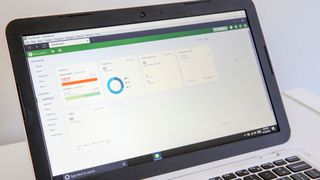Traditional accounting software resellers face a 'slow death by attrition'
The market shift towards SaaS is creating a race to the bottom, says Neil Robertson

Companies developing 'plug and play' applications, that can be purchased and implemented directly by the end user, are once again looking to the channel for added value.
From our perspective, both accounting software resellers and accounting practices can add a great deal to our product set and as a direct result, the quality of our customers' experiences.
Historically, it required a very significant investment by both the vendor and the reseller, and the reseller to achieve a very high level of self-sufficiency, for the relationship to work - therefore there were only so many applications they could adopt.
The question became which software applications delivered the best return. Plug and play massively reduces this learning curve, removing the investment issue and once again making the channel a suitable environment for software vendors like Compleat.
However, another reason companies are returning to the channel is simply because they have products the channel needs.
Getting the revenue split right
Accounting software resellers, for example, are having to find new revenue opportunities as the majority of accounting software applications have moved to a SaaS model. The move from a capital purchase of a perpetual software license and annual maintenance, to monthly subscription services, fundamentally changes the revenue model for resellers, increasing their dependency on added value services to remain profitable.
However, it's not as easy as just partnering with a few VARs. Companies re-entering the channel, or first-time channel participants, need to get the revenue split right to ensure the financial model works for both the vendor and the reseller while still benefiting the customer.
Channel Pro Newsletter
Stay up to date with the latest Channel industry news and analysis with our twice-weekly newsletter
But, channel expectations of the revenue mix need to be realistic. Moving to a recurring revenue stream is painful, as it takes a considerable amount of time to build - we know because we have been going through it for the past four years.
The good news is for resellers, SaaS revenue offers a much higher company valuation that the perpetual license/annual maintenance model, provided that you can demonstrate your ability not only to win new customers, but to keep them year on year.
'Slow death by attrition'
The financial software market is undergoing the most significant change in decades as the true, long-term implications of SaaS become clear.
The old perpetual license sale and annual maintenance model is rapidly disappearing. Instead of one lump sum followed by annual maintenance renewal, a new sale generates as little as one 36th of the revenue, but it can continue indefinitely.
The challenges are increasing at the low end as the competition within the channel increases. The revenues associated with applications like Xero are already under pressure as the large channel players fight for market share and the software vendors do the same, driving down revenue per unit sale for all.
At the same time accounting practices are under pressure from new regulation that has seen their traditional revenue streams shrink (for example, due to a loss of audit business). These are securing their slice of the pie by offering both automation and financial management services to their clients, including outsourced accounting services. While this transition by accounting practices is still at an early stage of development in the UK, it will continue to grow.
In response, many traditional resellers have become 'farmers', working more closely with their customers to sell add-on applications and services, reducing the dependency on new customer wins.
However, they are slowly losing those customers to new SaaS accounting applications, bigger channel players and accounting practices, so unless they can revitalise their new customer sales activities, it will be a slow death by attrition.
Race to the bottom
The implications are that traditional accounting software resellers are in for a tough time.
Lower revenues per sale, increased competition from accounting practices and, perhaps most importantly, existing customers moving to a SaaS model, are reducing their underlying revenues as a result.
Either this part of the channel evolves, or it will die - or more likely, drive a consolidation frenzy as small resellers are absorbed into larger ones.
This is becoming a race to the bottom and there will be casualties as the pressure of SaaS subscription revenue on cash flow simply becomes too much for those channel organisations failing to compensate with growing services income.
Ultimately, the software vendors that offer applications that deliver the least competition, the highest sales conversion and retention rates, the highest level of additional service income and the lowest cost of entry will dominate the channel as it evolves. Vendors that have not traditionally been channel focussed are recognising this and building channel programmes as a result.
From our re-entry perspective, we are looking for partners that immediately understand the opportunity, have already recognised the threat to the 'old business' and are looking to add applications that help them to differentiate to win more new customer sales and upgrade their existing customer base. If they have not already accepted the need to evolve, it is probably already too late.
Neil Robertson is CEO of Compleat Software




